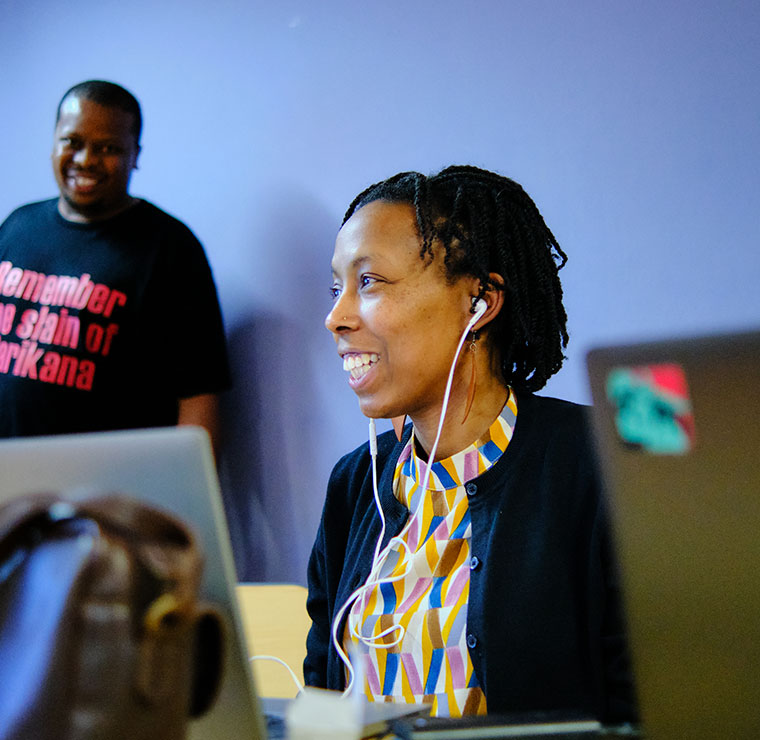

The SETA Project alliance includes ActionAid, Ação Educativa, National Campaign for the Right to Education, CONAQ, GELEDÉS, Makira-E’ta and UNEafro Brasil, recognized organizations committed to working in the field of anti-racist education. Also, at the same time, is the centrality of actions with black, quilombola and indigenous people, particularly girls and women, as well as teachers and other actors in the school community. At the international level, ActionAid joins experts from different regions of the world to understand and influence global anti-racist education.

[ saiba mais ]
ActionAid is an international Federation that works for social justice, gender and ethnic-racial equity and the end of poverty in more than 45 countries through partnerships with other organizations and social movements. Founded in 1972, and based in Brazil since 1999 as a Brazilian organization, it is the co-manager of the SETA Project and carries out national and international coordination, produces research, promotes training, supports campaigns and monitors the project.

[ saiba mais ]
Ação Educativa is a non-profit civil association, founded in 1994, a reference in Brazil for its work in the areas of youth education and culture, from the perspective of human rights. Its mission is to promote democracy, social justice and socio-environmental sustainability in Brazil. It works at SETA producing research, training and public mobilizations.

[ saiba mais ]
The National Campaign for the Right to Education is considered the broadest and most plural articulation in the field of education in Brazil, constituting a network that articulates hundreds of groups and entities distributed throughout the country. The Campaign’s mission is to work towards the implementation and expansion of educational policies so that all people have guaranteed their right to free, inclusive, secular and quality public education in Brazil.

[ saiba mais ]
UNEafro Brasil convenes and mobilizes groups of young black people, activists and promoters, including teachers, university professors and researchers in defense of themes related to anti-racism, feminist and community leadership, sexual diversity, the right to education and the fight against all types of discrimination. Among the highlights are the community pre-university courses that serve young people and adults from public schools, primarily black, who dream of entering Higher Education and preparing for the ENEM or Public Exams.

[ saiba mais ]
CONAQ (National Coordination of Black Rural Quilombola Communities) is a nationwide organization that represents the vast majority of quilombolas in Brazil. It fights for the implementation of sustainable development projects, for the implementation of public policies taking into account the organization of quilombo communities; for quality education consistent with the way of living in quilombos; for the agency and autonomy of quilombola women; for the young person’s permanence in the quilombo and, above all, for the common use of the territory, natural resources and for being in harmony with the environment.

[ saiba mais ]
Makira E’ta – Network of Indigenous Women of the State of Amazonas is an independent civil society organization (OSC), without political-party ties, with non-economic purposes, founded in 2017. It is marked by the constant struggle for political and social rights and the agency of indigenous women.

[ saiba mais ]
GELEDÉS Black Women’s Institute founded on April 30, 1988. It is a civil society organization that stands in defense of women and black people as it understands that these two social segments suffer from disadvantages and discrimination in access to social opportunities due to racism and of sexism in Brazilian society.

ActionAid is an international Federation that works for social justice, gender and ethnic-racial equity and the end of poverty in more than 45 countries through partnerships with other organizations and social movements. Founded in 1972, and based in Brazil since 1999 as a Brazilian organization, it is the co-manager of the SETA Project and carries out national and international coordination, produces research, promotes training, supports campaigns and monitors the project.

Ação Educativa is a non-profit civil association, founded in 1994, a reference in Brazil for its work in the areas of youth education and culture, from the perspective of human rights. Its mission is to promote democracy, social justice and socio-environmental sustainability in Brazil. It works at SETA producing research, training and public mobilizations.

The National Campaign for the Right to Education is considered the broadest and most plural articulation in the field of education in Brazil, constituting a network that articulates hundreds of groups and entities distributed throughout the country. The Campaign’s mission is to work towards the implementation and expansion of educational policies so that all people have guaranteed their right to free, inclusive, secular and quality public education in Brazil.

UNEafro Brasil convenes and mobilizes groups of young black people, activists and promoters, including teachers, university professors and researchers in defense of themes related to anti-racism, feminist and community leadership, sexual diversity, the right to education and the fight against all types of discrimination. Among the highlights are the community pre-university courses that serve young people and adults from public schools, primarily black, who dream of entering Higher Education and preparing for the ENEM or Public Exams.

CONAQ (National Coordination of Black Rural Quilombola Communities) is a nationwide organization that represents the vast majority of quilombolas in Brazil. It fights for the implementation of sustainable development projects, for the implementation of public policies taking into account the organization of quilombo communities; for quality education consistent with the way of living in quilombos; for the agency and autonomy of quilombola women; for the young person’s permanence in the quilombo and, above all, for the common use of the territory, natural resources and for being in harmony with the environment.

Makira E’ta – Network of Indigenous Women of the State of Amazonas is an independent civil society organization (OSC), without political-party ties, with non-economic purposes, founded in 2017. It is marked by the constant struggle for political and social rights and the agency of indigenous women.

GELEDÉS Black Women’s Institute founded on April 30, 1988. It is a civil society organization that stands in defense of women and black people as it understands that these two social segments suffer from disadvantages and discrimination in access to social opportunities due to racism and of sexism in Brazilian society.
We recognize that race does not operate alone as a basis for structural inequality, which is why the SETA Project takes an intersectional approach. This approach is driven by four of our partners who directly represent our priority groups: black rights movements across Brazil (UNEafro), black women (GELEDÉS), indigenous women and Makira-E’ta indigenous rights, and quilombola rights (CONAQ) .

Internationally, the SETA project has partnered with the pioneering Center for Comparative and International Research in Education (CIRE) at the University of Bristol’s School of Education, whose researchers have been leading work on decolonizing education and anti-racist education theory and practice in school systems across the world. the world. To stimulate debate and action in key global spaces, SETA works closely with the Global Campaign for Education, with regional education coalitions in Africa (ANCEFA), Asia (ASPBAE) and Latin America (CLADE), with Education International (the teachers’ union federation), with the Right to Education Initiative (a consolidated reference in educational rights), and with the recently emerged Global Student Forum.
Ana Paula Brandão
Programmatic director at ActionAid Brazil and strategic manager of the SETA Project. She was manager of the Color of Culture project at the Roberto Marinho Foundation.
Sandra Vale
Operational manager of the SETA Project.
Luciana Ribeiro
Education specialist in the SETA Project.
Karoline Kass
Education specialist in the SETA Project.
Jaqueline Santos
Specialist in Monitoring and Evaluation of the SETA Project.
Marcelo Perilo
Specialist in Monitoring and Evaluation of the SETA Project.
Naiara Evangelo
Communication specialist for the SETA Project.
Glauce Arzua
Director of Public Engagement at ActionAid Brazil and communications manager for the SETA Project.
Rosana Santos
SETA Project finance specialist.
Eduardo Callado
Producer of the SETA Project.
João Fernando Silva
SETA Project intern.
David Archer
Head of Programmes and Influencing at ActionAid International.
Zama Mthunzi
Global Advocacy for SETA Project.
Maria Corrêa
Specialist in Educational Coordination and Management.
Natália Queiroz
Intern at the SETA Project.
Daniela Vieira
Specialist Consultant in Coordination.
The W.K. Foundation Kellogg (WKKF) announced in 2020, the year in which it celebrated 90 years of history, the 2030 Racial Equity Challenge, a competition launched to promote initiatives that foster an equitable society for children, families and communities around the world.

The Challenge received 1,453 entries from 72 countries, and in September 2021, 10 finalists were announced. Each received an investment for the planning phase and 9 months of training. In October 2022, the SETA Project and four other projects were selected to receive, together, 80 million dollars over 8 years, to be completed by 2030, on the Foundation’s 100th anniversary.
We have put together the answers to your main questions into categories. Just click on the subject you are looking for to filter the questions already answered.
Structural racism in Brazil has systemically hindered access to the right to equal and quality public education by black, quilombola and indigenous students. The quality of education that children receive in Brazil is deeply segmented by racial and socioeconomic status. And, today, it is identified that the gaps between white children and black, quilombola and indigenous children, in all basic education indicators, are persistent and more serious for young people aged 11 to 17. Black, quilombola and indigenous children and young people are the most likely to drop out of school, have higher exclusion rates and have lower educational levels. Therefore, they are assigned the less prestigious and lower-paying jobs as adults. Meanwhile, white students internalize the racial inequities they are exposed to in schools and replicate them as adults. When looking at learning indicators, it is also concluded that there are not only more barriers to accessing school for black, quilombola and indigenous children, but that once at school, these children are less likely to access quality education.
The SETA Project seeks to carry out transformative actions based on evidence resulting from studies that help to understand the complexity of racial relations in the country and the resulting problems that need to be faced. In this sense, it foresees a series of studies with national and regional perspectives in its territories of intervention, especially in Amazonas, Maranhão, Rio de Janeiro and São Paulo. The objective is to map the perception of society in general, of education professionals and students about racism, racial inequalities in general and in education, the effectiveness of policies to combat racism, the gaps in tools and methodologies to promote racial equity and successful strategies and good national and international practices that can inspire actions to value diversity and differences and mitigate inequalities, especially in the area of education.
1) Biannual public mapping survey on perceptions of racism in Brazilian society.
2) Biannual focus groups on school communities’ perceptions of racism.
3) Monitoring and evaluation of educational indicators with analysis of education indicators focusing on race, gender and territory.
4) Studies led by the organizations that make up the SETA Project on “indigenous school education”, “quilombola school education”, “educational trajectory of black girls”, “black youth, education and violence”, “impact of secondary education reform on deepening of educational inequalities” and “participatory construction of indicators and diagnosis on quality in education and racial relations”.
All of these productions are/will be made publicly available to assist society in the construction of qualified narratives, based on the portrait of reality, in defense of racial equity in education, in addition to guiding project actions.